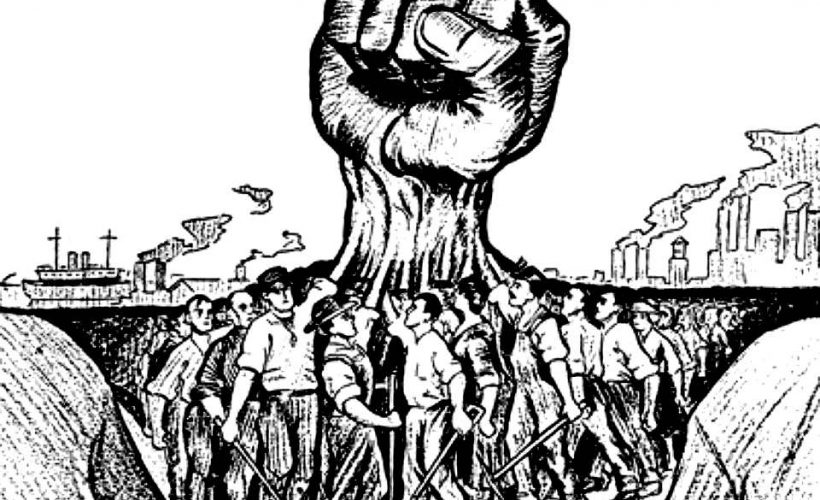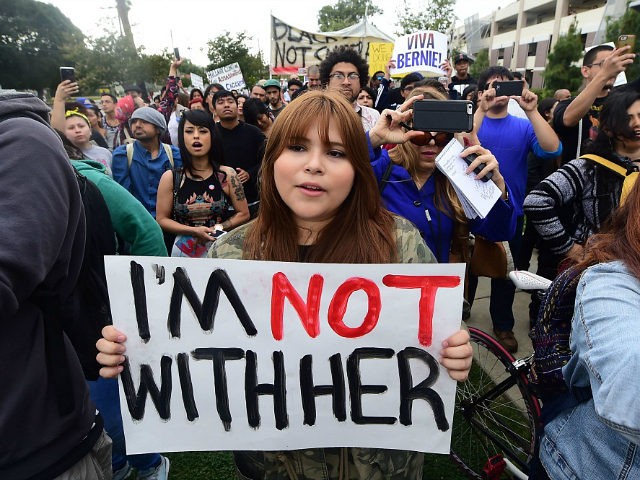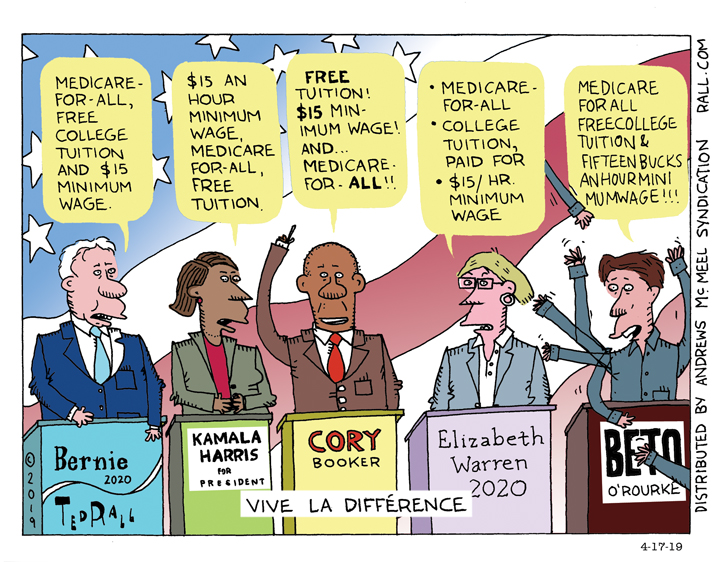Most of the major candidates for the Democratic presidential nomination are copying Bernie Sanders’ three-pronged platform of a $15 minimum wage, Medicare-for-all and free college tuition. How do you differentiate if everyone promises the same thing?
Here is the Progressive Agenda

Clintonite corporatists still control the Democratic National Committee despite their long string of failure at the polls. But the overwhelming majority of Democratic Party voters—72%—are self-identified progressives.
44% of House primary candidates in 2018 self-IDed as progressive. If you’re after the Democratic nomination for president you have to be—or pretend to be—progressive. Even Hillary Clinton claimed to be “a progressive who gets things done.”
All the top likely contenders for 2020 claim to be progressive—but they would prefer that voters ignore their voting records and unsavory donors. “Kirsten Gillibrand, Cory Booker, and Kamala Harris have spent the past two years racing to the leftmost edge of respectable opinion,” reports New York magazine. “In recent weeks, they have also all reached out to Wall Street executives, in hopes of securing some funding for their prospective presidential campaign.” It does no good for your heart to be in the right place if your ass is owned by bankers.
“You don’t just get to say that you’re progressive,” Representative Pramila Jayapal, co-chair of the Congressional Progressive Caucus, told progressive donors recently.
Jayapal, a Washington Democrat, called the 2020 election a chance to “leverage our power.” She says it’s critical “that we have some very clear guidelines about what it means to be progressive.”
Here are those guidelines.
You can’t be a progressive unless you favor a big hike in the minimum wage. Elizabeth Warren, the first pretty-much-declared candidate for 2020, wants $15 an hour. But she told a 2013 Senate hearing that it would be $22 if it had kept up with increases in worker productivity. The official inflation rate makes that $24 today. And according to the real inflation rate (the official number as it was calculated before the Labor Department downgraded the calculation in 1980 and 1990) at ShadowStats.com, $22 in 2013 comes to at least $35 today.
If the minimum wage had kept up with inflation since 1968 using the same methodology used to track inflation at the time, it would be closer to $80 per hour.
What should be the progressive demand for the minimum wage? Nothing less than $25 per hour.
(For the record, I see no reason why the minimum wage should be lower than the maximum wage. But we’re talking about progressivism here, not socialism or communism.)
Thanks to Bernie Sanders’ 2016 campaign “free college became a litmus test for liberals,” notes The Atlantic. But a 2017 bill cosponsored by Sanders and Warren defines “college for all” rather narrowly. It only addresses public colleges and universities. It would “make college tuition free for families earning $125,000 a year or less and allow current student loan borrowers to refinance their debt at lower interest rates.”
A quarter of American college students attend private schools. Considering that the average cost is $35,000 a year and some run as high as $60,000, even families earning more than $125,000 need help too.
The progressive stance on college should be three-pronged. First, the obscene $1.5 trillion student loan business should be abolished. Student loans should be replaced by grants but if loans exist at all they should be a zero-profit government program. Second, all outstanding loans should be forgiven or have their interest rates dropped to a zero-profit basis. Third, the government should rein in out-of-control public and private college tuition and fees—which have gone up eight times faster than wages—by tying them to the official federal cost of living index.
Progressives agree that Obamacare didn’t go far enough. With 70% of voters in favor, even centrist Democrats like Kamala Harris have climbed aboard Bernie Sanders’ call for “Medicare for all” bandwagon. Warren, Gillibrand and Booker now say they want single-payer public healthcare. Being progressive, however, means demanding more than what mainstream politicians deem practical—it’s about pushing hard for more ways to improve people’s lives.
In 2020 progressives should be calling for nothing less than universal healthcare. If it’s good enough for the rest of the developed world and many developing countries like Botswana and Bhutan, why not us?
I cosigned a letter to Sanders calling on the Vermont senator to use his platform as the country’s most prominent and popular progressive to talk more about foreign policy and to openly oppose militarism. Now it’s time to get specific.
Progressives should demand that U.S. troops come home from any country that did not attack the United States—i.e., all of them. They should put an end to the disgusting drone wars. The bloated nearly-$1 trillion Pentagon budget should be shredded; let’s see what they can do with $100 billion (which would still be far more than Russia’s defense spending).
From banks that charge usurious credit card interest rates to employers who fire full-time employees and hire them back as “independent contractors,” there are plenty of other targets for progressives to go after.
Progressives: you are no longer the ugly stepdaughter of the Democratic Party. You own the joint.
Now’s the time to demand what’s yours, what you want and what’s right.
(Ted Rall, the cartoonist, columnist and graphic novelist, is the author of “Francis: The People’s Pope.” You can support Ted’s hard-hitting political cartoons and columns and see his work first by sponsoring his work on Patreon.)
SYNDICATED COLUMN: The Outlook for Democrats in 2020 Currently Looks Bleak

First: No. It’s not too early to discuss the 2020 election. The Iowa caucuses are only a year and a half away. Any presidential hopeful who hasn’t begun chatting up donors by now will find it nearly impossible to mount a viable campaign.
At this point insert the usual caveats that anything can happen, no knows anything, scandals happen, politicians get sick, a year is an eternity in politics.
Let’s speculate!
On the Right: Donald Trump will almost certainly be the Republican nominee.
Impeachment? Republicans are knee-jerk loyal AF, so Democrats would have to initiate proceedings. House Minority Leader Nancy Pelosi says impeachment “is not somewhere I think we should go.” Also, note the word “minority.” Democrats can’t do jack without taking back the House — far from a sure thing.
A serious Republican primary challenge? Most incumbent Republican presidents have nothing to worry about there but Donald Trump is not most presidents. You can imagine a right-wing version of Ted Kennedy’s devastating 1980 challenge to Jimmy Carter.
The GOP doesn’t have superdelegates so it’s harder for the RNC to fix the race the way Democrats did for Clinton in 2016. Still, I don’t think a serious (as opposed to symbolic) challenge will materialize from the three currently most-talked-abouts. Jeff Flake can’t raise enough dough. (Trump, on the other hand, already has a whopping $88 million.) Mitt Romney could self-fund but seems too bogged down in Utah’s primary race for Senate to have time to pivot for another presidential run in 2020. Ohio governor John Kasich is beloved by the Beltway media but not GOP primary voters. I could be wrong. But my political instincts say Trump will coast to renomination without a significant primary challenger.
On the Left: The Democratic nomination belongs to Bernie Sanders. If he wants it.
Neither the centrist-controlled Democratic National Committee nor its official mouthpiece the New York Times have learned anything from the debacle of 2016, when guaranteed-to-win Hillary Clinton lost to Trump because she and the party snubbed Bernie Sanders and the progressive wing of the party he represents. These days, they’re floating Elizabeth Warren.
Until 2016 progressives saw Warren as a Bernie alternative but then she lost her leftie street cred by endorsing and supporting Clinton.
“On her Western swing, Ms. Warren sought to strike a unifying chord. At a tapas restaurant in Salt Lake City, she said Democrats had to close ranks in 2018 in order to recapture the White House. “Perhaps most appealing to Democratic leaders,” wrote the Times, “Ms. Warren might please their activist base while staving off a candidate they fear would lose the general election. A candidate such as Mr. Sanders.”
Throughout the campaign, polls showed that Bernie Sanders would have beat Trump.
My gut tells me Warren doesn’t really want to run. If she does, she’ll have charisma problems. As Boston magazine pointed out last year, even the people of Massachusetts aren’t much into her. (Bernie Sanders has the highest home-state approval rating of any U.S. senator, 75%.)
Given a choice between Sanders and Warren, progressives will choose the reliable progressive over the accommodationist pragmatist. That said, Warren would make a fine veep option.
As mayor of Newark, then up-and-coming political star Cory Booker made headlines by rushing into a burning house to save a woman in 2012. But politics is a fickle mistress. In the “what have you done for us lately” category, Booker was chastised for tying right-wing Republican Mitch McConnell as the senator who received the most contributions from the big Wall Street banks who destroyed the economy in 2008-09. This won’t affect his standing among the corporatists who supported Hillary Clinton despite her fundraising in the Hamptons. But it makes him anathema to the progressive Democratic base.
Once again, Joe Biden is being touted as a possible Democratic candidate. But he has signaled that, once again, he’s funnin’, not runnin’. Yeah, but what if he does?
Biden would have no choice but to compete for centrist votes against Booker and California’s Kamala Harris. Though once known as more liberal, his vice presidency for centrist Democrat Obama, his focus on building a Southern strategy for the primaries and his disconnection from the left makes him unlikely to appeal to the Berniecrats.
Harris, a law-and-order “lock ‘em up” former prosecutor and California senator, seems to be running a Clinton-style identity politics-based campaign based on her double history-making potential as a woman of color. While it’s true that she hasn’t always been a lock-step establishmentarian, she has gotten much closer to banks, cops and other elites than ordinary Americans as she has considered how to market her policy positions.
Harris is canny.
Some say slippery.
Harris is the biggest threat to Bernie. Harris supports “the concept of single-payer healthcare, and bills to incrementally raise the minimum wage to $15 an hour, eliminate tuition and fees at four-year colleges and universities for families making up to $125,000 and creating more campaign finance disclosure requirements for corporations, unions and super PACs.” Good stuff. Call her Berniedette?
But those are official positions. She doesn’t campaign on them. It’s like how Obama’s 2008 campaign website promised a public option on the Affordable Care Act/Obamacare, but he never talked about it and then never proposed it in his healthcare bill. Good positions don’t get far unless they’re articulated loudly and repeatedly.
The Democrats are a 50-50 party divided between progressives and liberals. Three serious liberals — Harris, Warren, Booker and whoever else pops up between now and then — divvy up the liberal half. Bernie Sanders has the progressive half all to himself. So he wins the nomination —if he wants it.
I think he does.
In the general election? This is sad, and bad for America’s baby Left, but I think it’s true: Trump defeats Sanders. Not because he’s a self-declared democratic socialist though you can be sure GOP attack ads will be full of stock footage of old Soviet May Day parades. Also not because he’s too far left: he really would have beaten Trump in 2016.
Trump defeats Sanders because of the innate advantages of incumbency, the historical hesitancy to change horses midstream, Sanders’ advancing age and the sad fact that the DNC will never push for him as hard as they would have for one of their own: a Wall Street-friendly corporatist.
Again: anything can happen, no knows anything, scandals happen, politicians get sick, a year is an eternity in politics.
(Ted Rall (Twitter: @tedrall), the political cartoonist, columnist and graphic novelist, is the author of “Francis: The People’s Pope.” You can support Ted’s hard-hitting political cartoons and columns and see his work first by sponsoring his work on Patreon.)
SYNDICATED COLUMN: Democrats Want to Lose the 2020 Election
 “I am not a member of any organized political party,” Will Rogers said ages ago. “I am a Democrat.”
“I am not a member of any organized political party,” Will Rogers said ages ago. “I am a Democrat.”
So frustration with America’s officially-licensed nominally liberal political party is not new. Even for them, though, I can’t imagine that any party ever worked as hard to pull defeat from the jaws of victory as the Dems are doing now.
Democrats ought to be poised for great things. True, they recently suffered a shattering rout. But eight months feels like a million years ago. Trump’s disapproval rating is a whopping 64%. That’s Nixon During Watergate level — and it includes a third of Republicans, who say the president has no respect for democratic institutions. (What are the other two-thirds thinking?)
After a mere five months in office, impeachment is a realistic possibility.
And OMG the non-Trump Republicans — they’re stuck! Tax cuts for the rich and infrastructure bills are dead letters. They can’t repeal Obamacare — not their “mean,” benefits-slashing way — without pissing off the vast majority of the country. And they can’t not repeal it without pissing off the GOP’s hard-right base. “I don’t know that we could pass a Mother’s Day resolution right now,” Matt Gaetz (R-FL) said in March. They’re even more screwed now, reduced to trying to pass their secret repeal bill in the dead of night so no one notices.
Oh, to be a Democrat in an age of GOP political suicide! Except for one big problem: they’re in even more trouble than the Republicans.
Many Dems think they’re headed to a big win in 2018, dreaming of taking back both houses of Congress. After four years of Trump (or four years of Trump, impeachment, then Pence), a grateful nation will turn to the Democrats — right?
I wouldn’t bet on it.
Pundits are so focused on the civil war tearing apart the GOP that they’re missing the even wider schism within the Democratic Party. Despite leading the party to defeat, the centrist-Third Way-DLC-Hillary Clinton wing of the party still runs the DNC and the state apparatuses. They’ve never made nice with Bernie Sanders or his leftist-progressives — the party’s base and its most committed ideologues — after repeatedly insulting and marginalizing them during the campaign. To the contrary, they’re still at it.
The Clintonites blame the Sandernistas for not voting and giving us Trump; the Berners ask, what part of “we’re not just falling in line for another corporate Democrat anymore” do you not understand? (I still can’t get over the fact that Hillary sought endorsements from war criminals Henry Kissinger and Condi Rice.)
You’ve been there with a spouse or a former friend: the two factions don’t speak the same language. Cynical incrementalism versus ambitious idealism don’t mix. So, as Democrats have tried to process 2016, talking (i.e., blaming) has only made things worse.
Certainly, Democrats may pick up seats next fall. But they certainly shouldn’t feel cocky about 2020.
Even if Trump is removed from office in disgrace, my first-Pence-then-Ryan scenario would leave the Republicans with a more united party and a standardbearer (Ryan) whose relatively sane demeanor will be less likely to motivate Democratic voters to the polls to vote against him.
Which leaves the question of who Democratic voters would be asked to vote for.
The answers are not promising.
The current frontrunner is New Jersey Senator Cory Booker. Once a promising charismatic upstart in the Obama vein, however, he has followed the golden footsteps of Hillary Clinton by selling out to the big Wall Street banks. Occupy Wall Street is dead but its death-to-the-banks spirit lives on among the Bernie Sanders faction of the party. As Hillary learned, Democrats can win nominations without the Bernie folks, but not general elections.
Virginia governor Terry McAuliffe, a center-right operator best known as the Clintons’ personal real estate guarantor, is gearing up a proto-campaign. He has a certain charisma. But consider how The Politico describes his elevator pitch: “a popular swing-state governor with a record to run on, a business background, and more connections to donors than any first-time presidential candidate ever.” Sounds like a winner…in 1992.
True, progressive stalwart Elizabeth Warren is flirting with a run — but this political animal predicts she won’t pull the trigger. So is Bernie Sanders. But he’ll be 79 in 2020. He’s energetic, but still — odds are, he’ll stay in the Senate.
Things can and will change. At this writing, though, there is no presidential prospect left enough for the Berners to get excited about and right enough for the party leadership to allow.
You can bet the Republicans will benefit from that vacuum.
(Ted Rall (Twitter: @tedrall) is author of “Trump: A Graphic Biography,” an examination of the life of the Republican presidential nominee in comics form. You can support Ted’s hard-hitting political cartoons and columns and see his work first by sponsoring his work on Patreon.)

